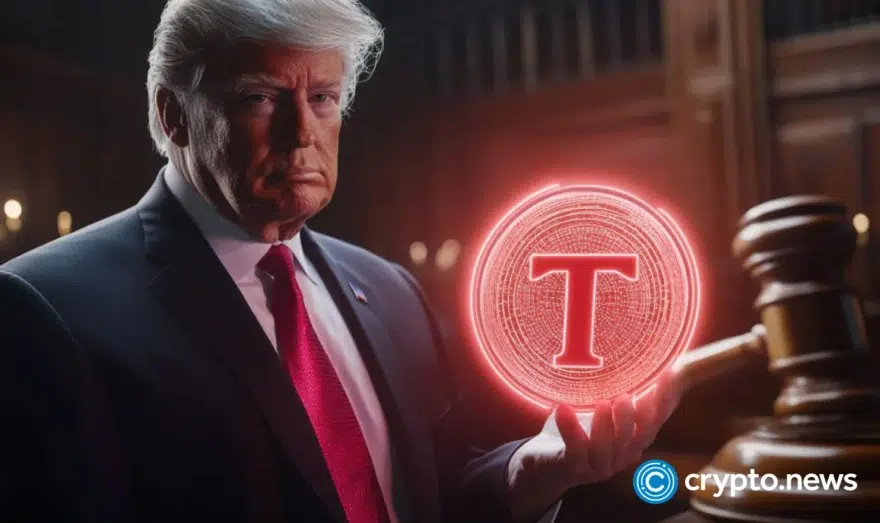Where 2024 US presidential candidates stand on the future of crypto

As the 2024 US presidential election looms, will the White House’s next occupant usher in a cryptocurrency bull market, or will they double down on stringent regulations?
Reigning President Joe Biden, who seeks a second term, has offered a mix of skepticism and caution towards the digital finance realm.
Under his watch, proposals like the 30% tax on crypto mining have stirred debate, while his 2023 Economy Report (Chapter 8) highlighted the speculative nature of many crypto assets, emphasizing the perils that even stablecoins can encounter, like the run risk.
Arrayed against him is a suite of challengers, each bearing their crypto credo. Many of them, such as Robert F. Kennedy Jr., Vivek Ramaswamy, Ron DeSantis, and the indefatigable Donald Trump, have voiced more favorable views toward Bitcoin (BTC) and its digital counterparts.
With their distinct visions for cryptocurrencies, these contenders promise a departure from the current administration’s perspective.
According to GMI PAC, a crypto-centric political action committee birthed in January 2022, nearly half of US voters (44%) either own or contemplate owning digital assets.
Such staggering numbers can’t be relegated to the back burner, especially when 17% of the electorate already swims in the crypto pool.
The poll divulged an almost uniform distribution among Democrats (18%), independents (16%), and Republicans (16%) owning digital assets. So, neither party can afford to sideline this demographic. Let’s dissect each candidate’s crypto stance and evaluate their potential ramifications for America’s digital future.
Joe Biden: Democrat
President Joe Biden, upon announcing his re-election bid on April 25, remains the most probable choice for the Democrat’s presidential nomination.
The Biden administration’s approach to crypto extends beyond mere skepticism. The president’s focus has, to a large extent, been on preventing tax evasion.
He vocalized opposition to perceived crypto “tax loopholes” and has been particularly critical of a debt ceiling agreement with the Republicans that he believes shelters “wealthy tax cheats and crypto traders.”
The milestone event for Biden’s crypto journey was perhaps his executive order in March 2023. This order laid the groundwork for the country’s first comprehensive framework on cryptocurrency, calling for notable actions such as a 30% tax on electricity used in crypto mining and proposing stricter measures on crypto wash sales.
Moreover, the crypto community’s pulse rate further surged on Aug. 25 when the IRS, under his watch, called for brokers to adopt revised regulations for trading digital assets. The intention was to make tax filing straightforward and avert evasion. The Department of the Treasury chimed in, indicating a desire to align digital asset reporting with that of traditional assets.
Yet, the reception from crypto stalwarts was frigid at best. Messari CEO Ryan Selkis openly speculated that a second Biden term might stagnate the US crypto industry.
Echoing Selkis’s concerns, Chris Perkins of CoinFund lamented the global edge other nations enjoy over the U.S. in the crypto sphere, a gap these new regulations might only widen.
As the crypto world evolves and the US election looms, one can’t help but wonder if a potential second Biden term might continue charting these careful, regulatory waters, favoring the anchors of oversight over the sails of unfettered innovation.
Donald Trump: Republican
Early in his presidency, Trump’s skepticism about cryptocurrencies was unambiguous. He was especially vocal about Bitcoin, casting doubts over its legitimacy by claiming it seemed like a “scam” and critiquing its potential competition against the U.S. dollar.
Trump’s memorable 2019 tweet cemented his then-stand: not being a fan of Bitcoin and other cryptocurrencies, stating that their value seemed “based on thin air.”
Furthermore, during his tenure, his administration zeroed in on the use of cryptocurrencies in illicit activities. An intriguing tidbit recounts Trump urging his Treasury Secretary, Steven Mnuchin, to clamp down on Bitcoin, especially in the context of trade sanctions against China.
However, not all was gloomy for crypto enthusiasts during Trump’s presidency. There were glimmers of optimism as he considered a capital gains tax cut, which could’ve turned the tide in favor of crypto users.
Additionally, key figures in his administration occasionally heralded the potential of distributed ledger technology as a tool that could refine government operations and strengthen the nation’s digital defenses.
It seems the allure of the digital age caught up with the former President after his White House days. On Aug. 25, the Trump-branded NFT trading cards became a talking point in crypto circles, highlighting a shift from mere skepticism to active participation.
Adding more weight to this change in perception, it was unveiled that Trump holds over $2.8 million in crypto assets within an Ethereum wallet. This, even as his public rhetoric often was critical of such assets.
If Trump’s past is a maze of fluctuating crypto sentiments, the future remains a tantalizing enigma. A return to the Oval Office could mean either a continued embrace of the crypto revolution or a revert to cautious diplomacy, ever vigilant of the shadows digital currencies might cast.
Ron DeSantis: Republican
Governor Ron DeSantis of Florida has carved a unique niche for himself amidst the cacophony of American politics. At the heart of his transformative vision lies a passionate advocacy for decentralized digital assets, making him one of the most crypto-friendly political figures in recent times.
Since the early days of his governorship, DeSantis recognized the transformative potential of digital currencies and blockchain technology. Under his leadership, Florida swiftly transitioned into one of America’s most crypto-conducive environments.
June 2021 marked a watershed moment when DeSantis inked a bill that established a clear regulatory framework for digital currencies.
His vision for blockchain is panoramic, envisioning its application from financial transactions to complex supply chain management and even healthcare solutions.
Yet, his advocacy isn’t just limited to business benefits. DeSantis’s dedication to educating the masses about crypto underscores his belief in its potential to reshape societies and economies.
Moreover, in his conversations with industry magnates like Elon Musk, DeSantis consistently foregrounds the merits of decentralized digital assets, lambasting central authorities for their apprehensions, rooted mainly in their inability to control such currencies.
However, not all digital assets receive the DeSantis stamp of approval. His critiques of Central Bank Digital Currencies (CBDC) are well-documented.
He perceives CBDCs as tools consolidating power from individuals to central authorities. DeSantis’s resistance to the idea of a CBDC even saw him move to prevent its implementation in Florida proactively.
His commitment to decentralized crypto assets was further highlighted when he promised to ban CBDCs at a national level, should he ascend to the presidency.
As the 2024 electoral drums beat louder, Ron DeSantis’s crypto advocacy positions him uniquely. While trailing Trump in several polls, DeSantis’s vision of a decentralized digital economy might resonate with a segment of the electorate keen on reducing centralized power.
Vivek Ramaswamy: Republican
In the unpredictable landscape of American politics, biotech entrepreneur Vivek Ramaswamy has emerged as a figure championing a distinctive blend of crypto advocacy and fiscal reform.
Invoking the ethos of Thomas Jefferson, Ramaswamy envisages Bitcoin as more than just a digital asset; he perceives it as an embodiment of foundational American values.
Ramaswamy’s articulation at the Bitcoin 2023 conference was impactful, painting a comprehensive picture of his crypto philosophy. He fervently argued against categorizing Bitcoin as a security, highlighting the decentralized and finite characteristics that set it apart.
His criticism of the Federal Reserve’s centralized interventions, alongside his vehement opposition to the Biden administration’s proposed excise tax on crypto mining, indicates a clear vision for a decentralized financial future.
Moreover, his call to make the 2024 election a “referendum on sound money in the US” is a testament to the centrality of monetary reform in his campaign.
While numerous political figures have recently jumped on the crypto bandwagon, Ramaswamy asserts that he is the sole candidate equipped with the intricate knowledge required to navigate the complexities of the Bitcoin universe, a claim further accentuated by his accusations of DeSantis borrowing from his crypto playbook.
While Vivek Ramaswamy may be viewed as a dark horse in the race to the White House, his crypto-centric campaign and profound understanding of digital assets have made him an intriguing contender. Whether he manages to transform this niche expertise into broader electoral momentum remains to be seen.
Robert F. Kennedy Jr.: Democrat
In an era where digital discussions increasingly shape the political landscape, Robert F. Kennedy Jr. stands out as a fervent champion for cryptocurrencies, especially Bitcoin, and their potential to revolutionize the financial realm.
Kennedy’s support for the crypto sector is unwavering yet tempered by a forward-thinking and balanced perspective. He not only acknowledges the transformative benefits of cryptocurrencies but also underscores the crucial need for robust consumer protection.
Kennedy’s apprehensions regarding the environmental implications of crypto mining shed light on his enduring commitment to ecological conservation. His push for integrating renewable energy into crypto mining practices is a testament to his vision of sustainable digital asset development.
His critical stance on the Biden administration’s proposed 30% tax on crypto mining and skepticism towards CBDCs echo a central theme in his philosophy: a wariness of unchecked central authority.
This sentiment is further amplified by his embracing of BTC for campaign contributions and his personal investment in the currency on behalf of his children, showcasing his deep-seated belief in the crypto movement.
Kennedy’s presidential aspirations might be met with hurdles, but his efforts to weave crypto discourse into the core of political conversations are praiseworthy.
Tim Scott: Republican
South Carolina Senator Tim Scott emerges on the 2024 electoral canvas as a figure striking a delicate balance between recognizing the potential of digital assets and emphasizing the need for stringent regulatory mechanisms.
Senator Scott’s involvement with the Senate’s Financial Innovation Caucus underscores his commitment to understanding and shaping the digital landscape. By discussing issues such as digital assets, stablecoins, and CBDCs, he situates himself at the epicenter of financial innovation discussions.
Moreover, his co-sponsorship of the Equal Opportunity for All Investors Act hints at his intent to bring clarity and order to the digital asset domain, even if the bill did not pass.
Underlying his perspective is a clear acknowledgment of the growth in the digital assets industry, yet with a careful nod to the concerns that come with such expansive growth. As Scott points out, high-profile failures, regulatory inconsistencies, and potential illicit financing require due attention.
Whether this regulatory-centric approach will resonate with the American electorate remains an intriguing question.
What 2024 could mean for crypto
The 2024 presidential race is rapidly crystallizing as a pivotal moment for the future of cryptocurrency in the US. With a vast array of perspectives, from staunch advocacy to measured skepticism, the election promises to set a definitive trajectory for digital assets.
The shared emphasis, however, seems to be on the balance between innovation and regulation. As digital currencies edge closer to mainstream adoption, the chosen presidential candidate will not only influence the nation’s financial future but also potentially determine the global discourse on crypto.
















